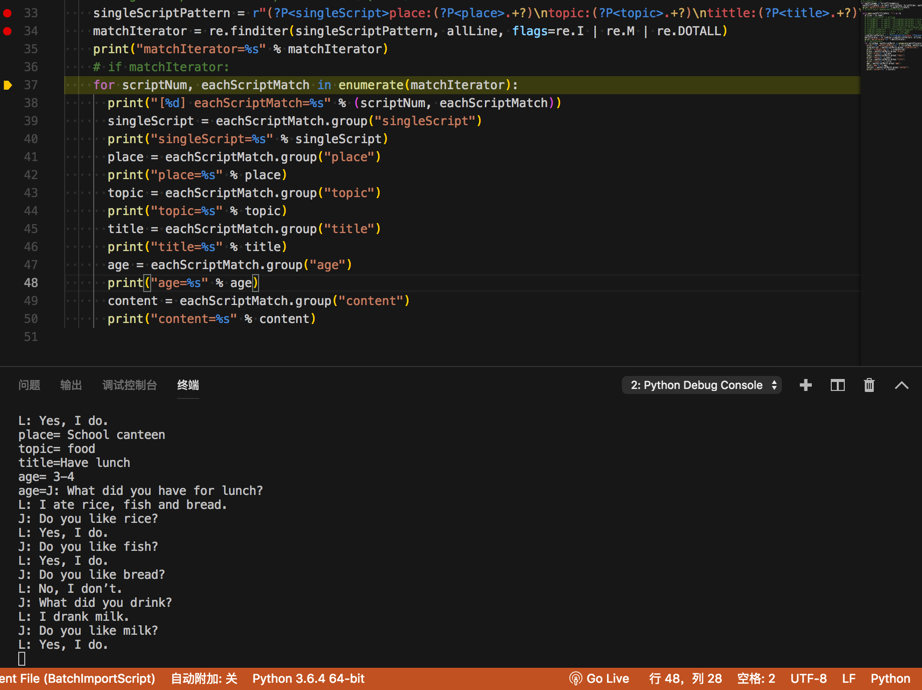re.finditer实例
从模式对话中提取出每段对话的信息
输入字符串:
Place: School canteen
Topic: food
Tittle:Have lunch
Age: 3-4
J: What did you have for lunch?
L: I ate rice, fish and bread.
J: Do you like rice?
L: Yes, I do.
J: Do you like fish?
L: Yes, I do.
J: Do you like bread?
L: No, I don’t.
J: What did you drink?
L: I drank milk.
J: Do you like milk?
L: Yes, I do.
Place: home
Topic: house
Tittle: Doing housework
Age: 4-5
J: Do you like cooking, mom?
M: Yes, I do a lot. What about you?
J: Mom, you know me. I can’t cook.
M: But can you help me wash dishes?
J: Yes, I can help you.
M: Let’s make a deal, ok?
J: What kind of deal?
M: I’m going to cook.
J: And then?
M: Then you wash the dishes after the meal.
J: That’s ok. I’ d like to help you mom.
M: You are a good boy.
。。。
代码:
singleScriptPattern = r"(?P<singleScript>place:(?P<place>.+?)\ntopic:(?P<topic>.+?)\ntittle:(?P<title>.+?)\nage:(?P<age>.+?)\n(?P<content>.+?))\n{2,1000}"
matchIterator = re.finditer(singleScriptPattern, allLine, flags=re.I | re.M | re.DOTALL)
print("matchIterator=%s" % matchIterator)
# if matchIterator:
for scriptNum, eachScriptMatch in enumerate(matchIterator):
print("[%d] eachScriptMatch=%s" % (scriptNum, eachScriptMatch))
singleScript = eachScriptMatch.group("singleScript")
print("singleScript=%s" % singleScript)
place = eachScriptMatch.group("place")
print("place=%s" % place)
topic = eachScriptMatch.group("topic")
print("topic=%s" % topic)
title = eachScriptMatch.group("title")
print("title=%s" % title)
age = eachScriptMatch.group("age")
print("age=%s" % age)
content = eachScriptMatch.group("content")
print("content=%s" % content)
log输出:
>matchIterator=<callable_iterator object at 0x10e3f7b70>
[0] eachScriptMatch=<_sre.SRE_Match object; span=(1, 309), match='Place: School canteen\nTopic: food\nTittle:Have l>
singleScript=Place: School canteen
Topic: food
Tittle:Have lunch
Age: 3-4
J: What did you have for lunch?
L: I ate rice, fish and bread.
J: Do you like rice?
L: Yes, I do.
J: Do you like fish?
L: Yes, I do.
J: Do you like bread?
L: No, I don’t.
J: What did you drink?
L: I drank milk.
J: Do you like milk?
L: Yes, I do.
place= School canteen
topic= food
title=Have lunch
age= 3-4
age=J: What did you have for lunch?
L: I ate rice, fish and bread.
J: Do you like rice?
L: Yes, I do.
J: Do you like fish?
L: Yes, I do.
J: Do you like bread?
L: No, I don’t.
J: What did you drink?
L: I drank milk.
J: Do you like milk?
L: Yes, I do.

匹配特定模式的成语
背景需求:
问题描述:使用Python正则表达式,进行汉语成语的模式搜索
搜索目的地:汉语成语词典
搜索目标:几种特殊模式的成语,例如:
(1)xxyy模式的,高高兴兴,快快乐乐
(2)数字模式的,三心二意,一泻千里
(3)动物模式的,鸡鸣狗盗,狐假虎威
(4)……
先将汉语成语文件准备好,再在文件中,使用正则表达式,进行搜索。搜索结果,显示在屏幕上,同时保存到一个结果文件中。
代码:
# Function:
# 请教怎样使用Python正则表达式,进行汉语成语模式搜索-CSDN论坛
# https://bbs.csdn.net/topics/396860414
# Author: Crifan
# Update: 20200619
import re
seperator = "-"
idiomStr = """高高兴兴
快快乐乐
快乐至上
欢欢喜喜
欢天喜地
一心一意
三心二意
一泻千里
三番五次
一鼓作气
以一敌万
鸡鸣狗盗
狐假虎威
兔死狐悲
狗急跳墙
"""
def printSeperatorLine(curTitle):
print("%s %s %s" % (seperator*30, curTitle , seperator*30))
def printEachMatchGroup(someIter):
for curIdx, eachMatch in enumerate(someIter):
curNum = curIdx + 1
# print("eachMatch=%s" % eachMatch)
eachMatchWholeStr = eachMatch.group(0)
print("[%d] %s" % (curNum, eachMatchWholeStr))
printSeperatorLine("xxyy模式成语")
# xxyyP = "(\S)\1(\S)\2"
# xxyyP = "(\S)\1(\S)\2"
# xxyyP = "(\S)\1"
# xxyyP = "(.)\1"
# xxyyP = "(.)\\1"
# xxyyP = "(?:P\S)\\1(\S)\\2"
xxyyP = "(\S)\\1(\S)\\2"
# foundAllXxyy = re.findall(xxyyP, idiomStr, re.S)
# foundAllXxyy = re.search(xxyyP, idiomStr, re.S)
# foundAllXxyyIter = re.finditer(xxyyP, idiomStr, re.S)
foundAllXxyyIter = re.finditer(xxyyP, idiomStr)
# print("foundAllXxyy=%s" % foundAllXxyy)
# for curIdx, eachMatch in enumerate(foundAllXxyyIter):
# curNum = curIdx + 1
# # print("eachMatch=%s" % eachMatch)
# eachMatchWholeStr = eachMatch.group(0)
# print("[%d] %s" % (curNum, eachMatchWholeStr)
printEachMatchGroup(foundAllXxyyIter)
# print("%s %s %s" % (seperator*30, "数字模式成语" , seperator*30))
printSeperatorLine("数字模式成语")
# refer:
# 个,十,百,千,万……兆 后面是什么?-作业-慧海网
# https://www.ajpsp.com/zuoye/4174539
zhcnDigitList = [
"一",
"二",
"三",
"四",
"五",
"六",
"七",
"八",
"九",
"十",
"百",
"千",
"万",
"亿",
"兆",
"京",
"垓",
"秭",
"穰",
"沟",
"涧",
"正",
"载",
]
zhcnDigitListGroup = "|".join(zhcnDigitList)
zhcnDigitP = "(%s)\S(%s)\S" % (zhcnDigitListGroup, zhcnDigitListGroup)
zhcnDigitIter = re.finditer(zhcnDigitP, idiomStr, re.S)
printEachMatchGroup(zhcnDigitIter)
printSeperatorLine("动物模式成语")
animalList = [
"鸡",
"鸭",
"猫",
"狗",
"猪",
"兔",
"狐",
"狼",
"虎",
"豹",
"狮",
# TODO:添加更多常见动物
]
animalGroup = "|".join(animalList)
animalP = "(%s)\S(%s)\S" % (animalGroup, animalGroup)
animalIter = re.finditer(animalP, idiomStr, re.S)
printEachMatchGroup(animalIter)
输出:
------------------------------ xxyy模式成语 ------------------------------
[1] 高高兴兴
[2] 快快乐乐
[3] 欢欢喜喜
------------------------------ 数字模式成语 ------------------------------
[1] 一心一意
[2] 三心二意
[3] 一泻千里
[4] 三番五次
------------------------------ 动物模式成语 ------------------------------
[1] 鸡鸣狗盗
[2] 狐假虎威
[3] 兔死狐悲